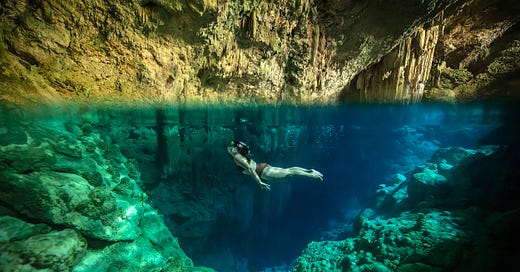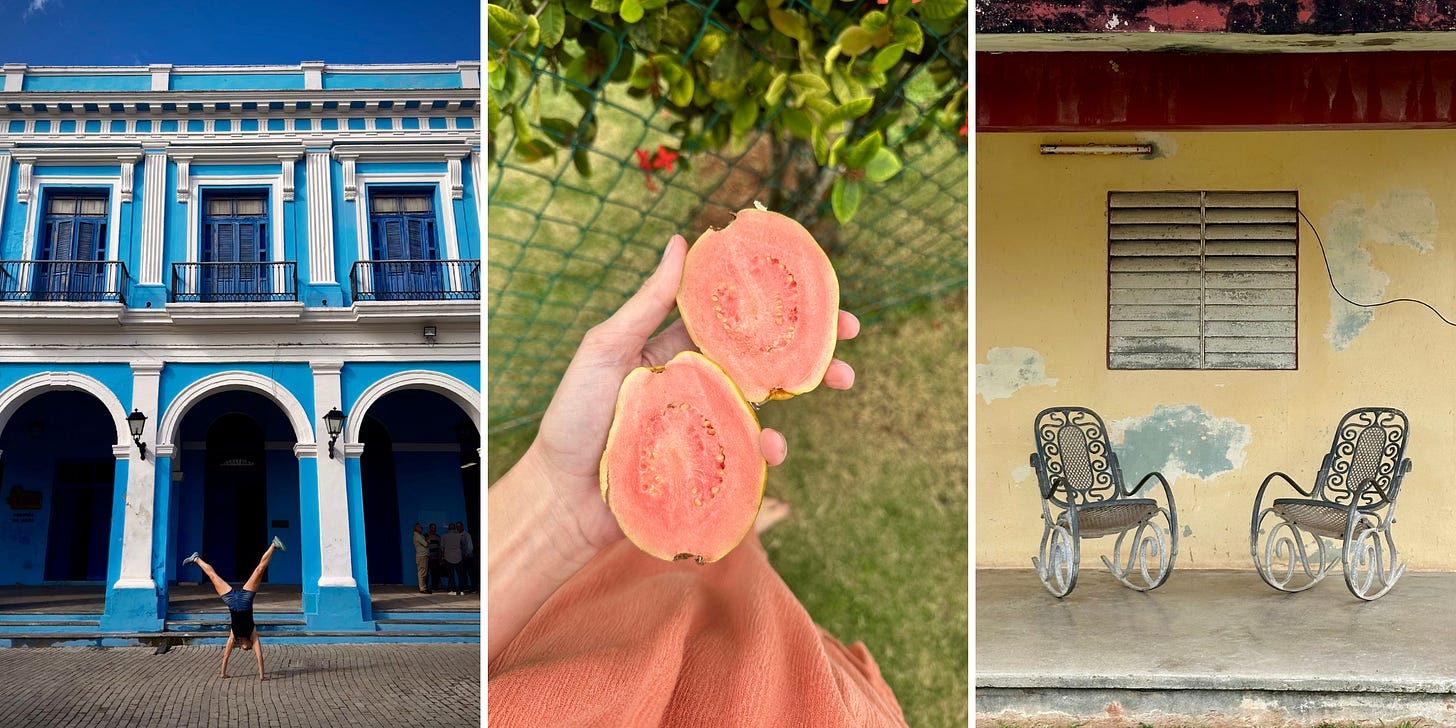“Is there a store where we can buy items like bread, milk, eggs and fruit?” I ask the clerk at the supermercado, in my best Spanish.
The look on her face tells me this is a stupid question. Or at least an ignorant one. But it is my first day in Cuba — my first day of reality checks on this island nation that is an island in more ways than one.
For over a year, Paul and I had been planning to spend a Christmas abroad, and when we found a well-rated guest house near one of Cuba’s best snorkelling beaches, we felt we’d hit the jackpot. We did, it turns out, but not for the reasons we had anticipated.
Our usual travel style is to rent apartments and get outside of the hotel bubble. I didn’t think I was being so ignorant when I overlooked the situation we were going to encounter in Cuba. I have always taken government travel advisories with a grain of salt, but perhaps I should have read these more closely (cautions about shortages turned out to be startlingly true). Instead, I had chosen the stance that, to deviate from my usual style of over-planning, I would land and figure things out…
There in the supermercado, our plans to do some cooking for ourselves quickly evaporate as we realize how difficult it will be to get our hands on ingredients that will create any semblance of a meal beyond pasta and tomato sauce. Or, if this is an episode of a reality TV show, it will be an exercise in what can we put together with canned lentils, olives, canned hotdogs, a wheel of parmesan cheese the size of a steering wheel, and an array of alcoholic drinks.
If I had the local intel on this first day, I might have known of the fruit stand on Calle 44 and the person in town who got their hands on some eggs. I might have known a guy would scooter by with a cart full of bread in the morning, and the “garlic guys” would follow soon behind, carrying long poles with braids of garlic hanging from them.
These were all things my group — my husband and daughters, mother, and two friends — would discover in the days to come, as life unfolded in Cuba.
“I don’t get travellers like you,” our host says. She is referring to the fact that most people stay in one of the nearby resorts, and might stay with her only a few nights. But here in our little seaside town, we are embedded with the locals for two weeks. We become familiar with their rhythms and the ways of life that exist in a small Cuban community, outside of big cities or all-inclusive resorts. The trade-off of not being able to do things as independently as we planned is the chance to immerse ourselves in the local beat, to watch horse-drawn carts and classic cars from our front porch, visit the local “coffee shop” where people buy everything from candy to cigarettes and barter their fruit for who-knows-what, and talk with the local children who are rollerblading by on uneven cement and weaving around telephone poles that stick out of the sidewalk.
Possessing only basic Spanish, I miss a lot in conversation. But I can see some things for what they are: the shack that people are living in one street over and how it must leak when it’s raining hard; the sputtering of mufflers and coughing of diesel from most cars and scooters (and little access to replacement parts); the smiles on people’s faces because it is the Cuban way, it seems, that no matter how much hardship they face, they are kind and generous. That’s not to say people are pretending to be happy for us. Conversations reveal an underlying sadness. Nearly everyone we come to know has family living abroad. Emigration is increasing. It is obvious that, at the end of 2023, many things are falling apart (see this study). Some of it is showcased in the crumbling buildings and faded signs that line the roadsides, much of it hidden under the surface.
Yet, this small town also feels like an oasis — it is quiet enough to hear both ocean waves and bird song. Life is simple, in the best possible way. I speak with a woman whose son now resides in Canada and is living the definition of the rat race. For all of her challenges in Cuba, she prefers the slow, the quiet, the simple.
We were there for the snorkelling but of our sixteen or so days in Cuba, we had good conditions only once. The seas were mostly too rough to even get in. The real “jackpot” came from the kindness of the people we encountered. Despite the food shortages, we were not hard done by. We avoided the scavenger hunt for ingredients because a neighbour nearby was an excellent cook and could prepare meals for us. Our host made our breakfasts and we cobbled together lunches of tuna or macaroni. We didn’t have a rental car but we had a lead on a reliable driver who could get us from A to B when we needed to. It was a Cuban kind of Christmas miracle, where everything we needed came to us (even a small Christmas tree!) — through sometimes comical and always heartwarming means.
Several times in the past two weeks, I stood by the churning seas and reflected on life back home, particularly on the stressful weeks that preceded the trip. I’ve felt called to set firmer boundaries going into 2024, and this trip helped me hit the reset button. But I’ve also had many lessons in Gratitude both from what I encountered in Cuba and what awaited me back home. I’ll admit that shopping isn’t on my list of favourite things to do, but having seen what’s available in Cuba, I return home forever humbled that I live in the Land of Plenty. I was also humbled by my reliance on our Cuban host and neighbours. Each day of the trip I felt the discomfort of needing to ask for assistance, of risking sounding ignorant and perhaps even offending someone without realizing it. But each time I asked, I opened a door to better understanding. Perhaps most profound was watching my young daughters navigating that same discomfort and thriving in a very new environment.
On our last day, we finally had calm seas for snorkelling. Fish of all kinds nibbled at food on the ocean floor, swam through the crystal-clear water, and darted left and right. I turned a corner where sunlight danced along a bed of sand and, there amongst the coral, a large school of light blue fish swam together in miraculous patterns, somehow keeping their bodies close as some unseen force moved them all together in unison. Then, they parted, and I swam through the middle of two schools, before the one on my right dove deep and swam slowly beneath my body.

Our world holds surprises for us, most often beneath the surface. If you know me, I’ve never been one for small talk or surface-level engagement. As I move into 2024, I’m all the more eager to dive beneath the surface, more often, even when it’s uncomfortable. Whether it’s with people, destinations, the landscapes I’m moving through, new experiences, or articles here on Field Notes, an unseen world awaits me if I’m ready and willing to go deeper. Vulnerability is the key that unlocks this richness.
As Brené Brown says, here’s to being brave, awkward and kind. ✌🏼
Ready to dive deeper with me? Upgrade to a paid subscription.
Meghan J. Ward is an outdoor, travel and adventure writer based in Banff, Canada, a Fellow of the Royal Canadian Geographical Society, and the author of Lights to Guide Me Home. Meghan has written several books, as well as produced content for films, anthologies, blogs and some of North America’s top outdoor, fitness and adventure publications.
What’s caught my attention lately… ✨
Here’s my meagre reading list from 2023! It’s funny, I feel like I’ve always got a book on the go, but my reading list this past year amounted to only 12 books. Some of my favs: Tom Lake and The Secret Life of Bees for some incredible and propulsive storytelling; Braiding Sweetgrass and Searching for Happy Valley for broadening my worldview; Four Thousand Weeks for helping me rethink time altogether, and of course Old Indian Trails of the Canadian Rockies, which was essential reading for Wildflowers.
Check these out too… 🙌
Lights to Guide Me Home - my memoir (reviews welcome on Amazon and Goodreads)
The Wonders That I Find - my children’s book
My Email Newsletter - updates about my books, projects, and 1:1 coaching
Related posts:
I am an eight-generation Canadian and a descendent of British, Scottish and German settlers living, working, and recreating outdoors in Treaty 7 Territory — the homelands and gathering place for the Niitsitapi from the Blackfoot Confederacy, including the Siksika, Kainai, and Piikani First Nations; the Îyârhe Nakoda of the Chiniki, Bearspaw, and Goodstoney First Nations; the Tsuut’ina First Nation; the Métis Nation of Alberta, Region III and many others. I am doing my utmost, both personally and professionally, to deepen my understanding of the history of Indigenous peoples and the impacts of colonialism — past and present.









Love the year in books...some of my favorites here!